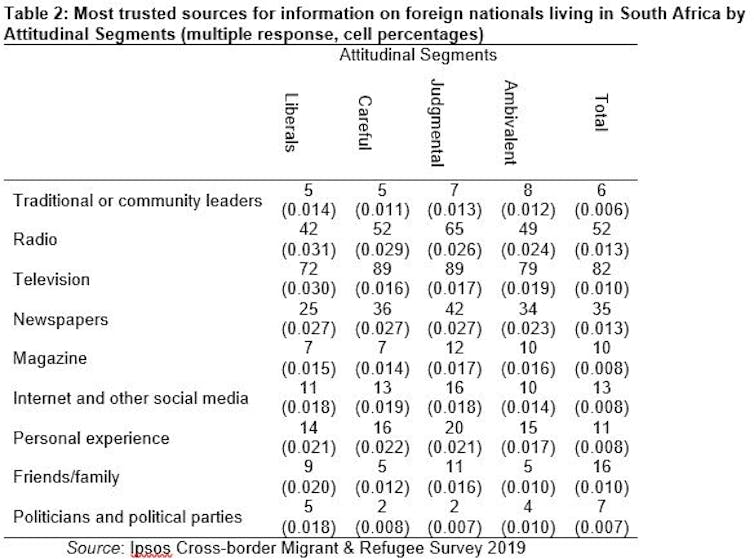
XENOPHOBIA is a serious problem in South Africa. Cross-border migrants, refugees and asylum seekers in the country face harassment and discrimination. Hundreds of incidents of anti-immigrant hate crime have been reported in the past decade alone. To address this, the government launched the National Action Plan to Combat Racism, Racial Discrimination, Xenophobia and Related Intolerance in March 2019.
The plan recognises that without quality data the government will struggle to design effective policies to change public attitudes towards foreigners. Targeted communication campaigns can be very effective in expanding tolerance between groups in a society, as research on reconciliation in Central Africa has shown. To organise effective targeted campaigns, policymakers and civil society need to identify and map how people in South Africa think about immigrants. To build an effective communication campaign you need to know your audience.
In a bid to close the gap, market research company Ipsos, in collaboration with the Human Sciences Research Council (HSRC), conducted a survey on anti-immigrant sentiment in South Africa. The survey covered the four provinces where most refugees and cross-border migrants live – Limpopo, KwaZulu-Natal, Western Cape and Gauteng.
Negative stereotypes about cross-border migrants and refugees were found to be common in many towns and villages, with people describing these groups as violent and dishonest. The research also sought to establish how South Africans who hold anti-migrant sentiments get most of their information about foreigners.
A population segmentation analysis method was employed to break down the population into distinct groups based on their views towards non-nationals. Other studies have examined the depth of anti-immigrant sentiment in the country, but this is the first study to effectively segment the population in this way.
The survey
The researchers conducted face-to-face interviews with 2,004 people over the age of 18 between October and November 2019. Fieldworkers visited a representative sample, speaking to the old and young, the rich and the poor. The data was then weighted to ensure representativity at the provincial level.
Survey participants were asked where they got their information about refugees and migrants. They were also asked which people’s views they trusted about these groups, and their views about integrating them in local communities.
Using public attitudes on a range of issues, researchers were able to segment the population into four distinct groups: “liberal”, “careful”, “judgmental” and “ambivalent”. This segmentation provided a rich amalgamated picture of differences in opinions.
The liberal cluster (20%) comprises people who are more likely to have open-minded views about refugees and migrants, and are more positive about their socioeconomic impact. The careful cluster (23%) is composed of those who accept the rights of refugees to seek sanctuary, but are concerned about the impact of immigration. The ambivalent cluster (31%) is largely disengaged and does not have strong views about migrants and refugees. The judgmental segment (26%) has the most negative views and tends to view migrants and refugees as a danger.
There are substantial demographic differences in the composition of the different clusters. These could be useful when designing communication campaigns.
Findings
One of the most important factors driving the formation of attitudes (and hence behaviour) is information. The kind and quality of information an individual can access influences that person’s attitudes.
The media was found to be potentially highly influential in changing public opinion on immigration. In addition, the data suggested that immigrant integration programmes can assist in the fight against xenophobia.
Trust in media
Respondents were asked to indicate which sources provided the best or most honest information on refugees and cross-border migrants. More traditional media platforms – radio, television, newspapers – were found to be more trusted than other sources, such as social media or community leaders.

This is similar to what a recent public opinion study on xenophobia by the HSRC found.
Given limited resources, communication efforts should target those media platforms that are the prime sources of information on immigration.
The table shows that the broadcast media, especially radio and television, were influential for the careful and ambivalent attitudinal clusters. People with the most prejudicial attitudes (the judgemental cluster) were also more likely to list radio and newspapers as trusted sources of information.
The results seem to suggest that, notwithstanding concerns about the role of the internet in promoting hate speech, anti-xenophobia campaigns should focus most of their energies on radio and television programmes (such as those hosted by the public broadcaster, the SABC). Here communication specialists need to look at successful media campaigns in other parts of the African continent.
Good leadership
The survey suggests that government communication campaigns can benefit from the cooperation of prominent leaders who are trusted by the general population. Political leaders (like South African president Cyril Ramaphosa) who command the respect of the populace need to speak out against xenophobia. But politicians are not the only ones that can help.
Religious leaders may be well placed to change hearts and minds on this issue. South Africans are deeply religious, and faith plays an important role in how people understand the world around them. We found that people in the liberal cluster were motivated to adopt a compassionate stance towards immigration because of their faith.
Christian leaders, in particular, can exert a great influence on dispelling anti-immigrant sentiments in their congregations. A majority of the careful and ambivalent clusters were members of Protestant churches. Many people in the judgemental group belonged to the Zionist Christian Church, the largest and most visible religious body in the country.
The power of integration
Survey respondents were asked if they had contact with cross-border migrants. Few members of the judgemental and ambivalent clusters reported having had positive contact. People in the liberal cluster had greater levels of positive contact.
Past research has showed that positive contact between locals and migrants reduced anti-migrant sentiment in South Africa. One of the most positive interventions that could assist foreigners in the country is integration programmes that promote coexistence with host communities.
Changing hearts and minds on immigration and combating xenophobia in South Africa can seem like a daunting task. But it’s not insurmountable. – The Conversation.














